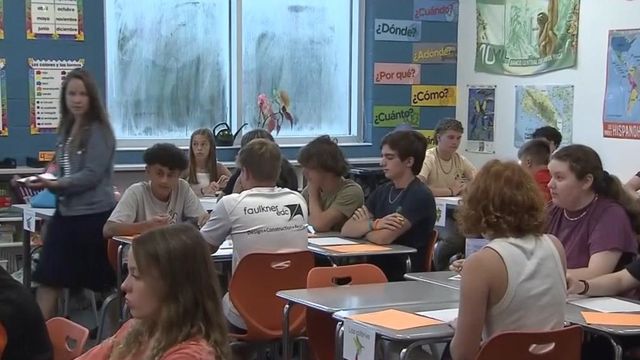AI in NC schools: DPI says teachers and students should use it, provides guidance on how
The North Carolina Department of Public Instruction has released guidance for educators on how to use artificial intelligence in the classroom. North Carolina is the fourth state in the nation to issue directives for how students and teachers using tools like ChatGPT in schools.
“Generative artificial intelligence is playing a growing and significant role in our society," said State Superintendent Catherine Truitt. Students need to be taught how to use artificial intelligence in an economy and society that will increasingly use it and expect workers to use it, she said.
Artificial intelligence can help teachers do their jobs more efficiently and provide more resources for students to learn, according to a department news release Tuesday. The department recommends teachers and students use it in all K-12 grade levels.
Using AI in all NC classrooms, but carefully
Some school systems have already embraced artificial intelligence to an extent, such as the Wake County Public School System. At the same time, teachers often still seek help from one another on how to spot student work that incorporates artificial intelligence. Some schools systems have blocked access to the popular ChatGPT website.
The state guidebook stresses the importance of incorporating AI into the classroom responsibly — using it as a tool to aid in learning without becoming too reliant on it. A prompt for a chatbot, for example, if input improperly, can result in a response that contains false information created by the chatbot, rather than merely pulled from online sources by the chatbot.
NCDPI and AI for Education created the 'EVERY' framework for ethically sound ways to implement AI.
- Evaluate the initial output to see if it meets the intended purpose and your needs.
- Verify facts, figures, quotes, and data using reliable sources to ensure there are no hallucinations or bias.
- Edit your prompt and ask follow up questions to have the AI improve its output.
- Revise the results to reflect your unique needs, style, and/or tone. AI output is a great starting point, but shouldn’t be a final product.
- You are ultimately responsible for everything you create with AI. Always be transparent about if and how you used AI.
Teachers could use artificial intelligence to automate administrative tasks or analyze student performance, according to the department.
Students could use it to help them translate languages or type papers using voice-to-text tools, if they have a physical challenge that make typing or handwriting challenging, according to the department.
Time, training will determine how AI is used in NC schools
The use of artificial intelligence in the classroom will depend to an extent how well anyone knows how to use it. A recent Education Week survey found most teachers don’t use artificial intelligence because they’re too busy doing other things. Even if artificial intelligence could save teachers time, teachers would first have to learn how to use it. The survey found many teachers don’t feel like they have time to learn it.
The department’s guide, which will be updated periodically, includes links to resources for teachers who want to learn more about how to use artificial intelligence. The list includes videos or courses specifically designed for educators. It also includes resources for teachers to use when instructing students on how to use artificial intelligence.
The department’s Office of Digital Teaching and Learning worked with AI for Education to develop a framework for teaching artificial intelligence ethically, focusing on how to ensure artificial intelligence can provide correct information and to review information it compiles.
NC DPI cautions against believing the use of artificial intelligence to write papers would be “cheating,” because of the likelihood that the same process and skill will be widely accepted in the world of work.
Instead, the department encourages teaching students to build on the results they get from a chatbot and to cite their use of a chatbot. The department cautions teachers against using artificial intelligence detectors to detect the use of artificial intelligence because some of them can yield false positives or have other issues.
Many teachers use these detectors, while many others rely on long-standing methods of detecting whether a paper was written by another person entirely, such as quizzing a student in conversation about the paper.











